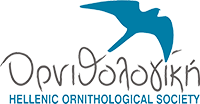The scientific data collection and exchange between Hellenic Ornithological Society and Birdlife Malta is an important step in the international collaboration for joint conservation of seabirds and their habitats in the Mediterranean. Both partners have joints forces to collect data regarding migratory routes of the Yelkouan Shearwater (Puffinus yelkouan), using modern methods, including satellite tracking. The Yelkouan Shearwaters is an endemic Mediterranean species of high conservation concern that breeds on islands, primarily in the central and eastern Mediterranean. Greece hosts approximately 4.000-7.000 breeding pairs of the Yelkouan Shearwater and is also an vital for its migration, because the entire global population of the species passes through the Aegean sea on its way to its wintering areas in the Black Sea and the Northern Aegean Sea.
In the framework of a LIFE-Nature project “Concrete conservation actions for the Mediterranean Shag and Audouin's Gull in Greece, including the inventory of relevant marine IBAs”, supported by the European Commission, researchers of BirdLife Malta equipped 8 juvenile Yelkouan Shearwaters with satellite transmitter in their colony on Malta. During the following months, 109 locations of these birds have been recorded, indicating their migratory routes. After leaving their nests, they stayed around Malta only for a few days before moving towards the coast of W Greece and the Aegean Sea in search for food.
In Greece, the surveys are carried out as part of a new LIFE+ project for the identification of Marine IBAs, where the marine distribution of seabirds, primarily Mediterranean Shag and Audouin’s Gull but also other species, including Yelkouan Shearwater, is being recorded. These efforts will continue until 2012 when the identified marine IBAs will be presented to the Ministry of Environment to the evaluated as potential Special Protected Areas (SPAs).
This project shows the importance of Greece for the protection of birds and their habitats on the global scale. An incredible mixture of habitats in Greece, including coasts, mountains, forests, glasslands and thousands of islets, joining three continents is ideals for the migration of millions of birds across the Mediterranean.
Tasos Dimalexis, Scientific Director of the Hellenic Ornithological Society stresses: “The need for international scientific collaborations shows that the nature has no borders. We hope that this is only the beginning of the conservation of seabirds and their habitats in Greece, which is still insufficient”.
Press and Communication Office
The LIFE+ Project «Concrete conservation actions for the Mediterranean Shag and Audouin’s Gull in Greece, including the inventory of relevant marine IBAs» (LIFE 07 NAT/GR/00285) is implemented by the Hellenic Ornithological Society in collaboration with ΜΟm, HCMR, TEI of Ionian Islands and SPEA in 17 Greek SPA sites during 2009-2012, with the financial support of the European Commission and the co-funding of the A.G. Leventis Foundation.



